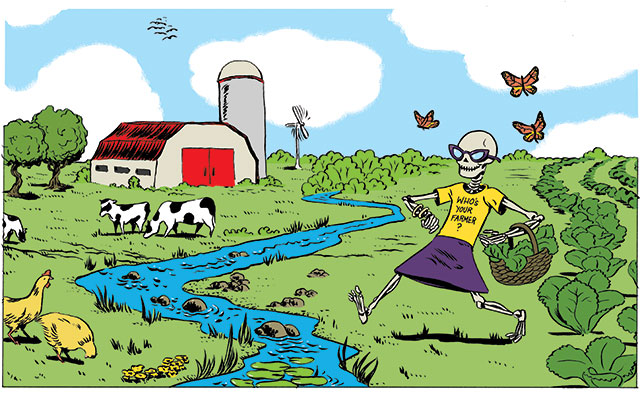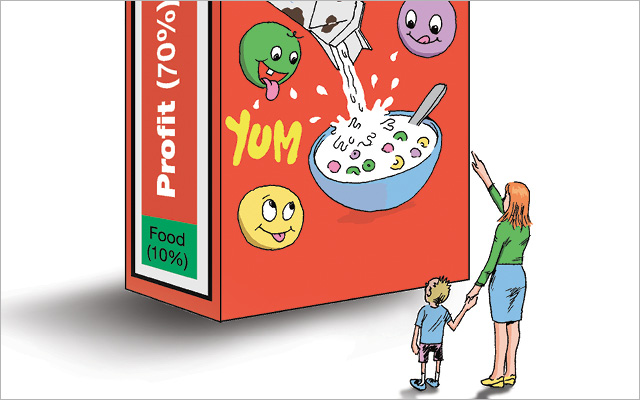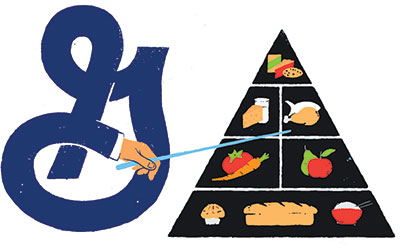You know what’s driving me bat-house nuts right now? Facebook acquaintances and Twitter followers who keep sharing — and liking — an image of a skeleton in a stone crypt with this caption (slightly sanitized for this family magazine): “Dang, I’m totally glad I ate organic.”
This latest salvo in a seemingly ubiquitous anti-organic campaign — driven at least in part by a supposedly “science-based” crowd that seems to spend most of their time aggressively defending Big Ag, Big Food, and Big Pharma — suggests we abandon organic foods because . . . they have failed to end human mortality?
Not so fast, I say.
If I get hit by a bus tomorrow, I’ll go to my grave delighted that I ate organic. Here’s why:
- Downstream impacts. By choosing organics, I avoid financing conventional farming’s addiction to chemical fertilizers and pesticides — compounds that drain into rivers that empty into oceans and create vast dead zones, resulting in an overgrowth of algae, which then decompose, sucking all the oxygen out of the water and killing everything else.
- Antibiotic responsibility. I help conserve antibiotics for human use, instead of squandering them on overcrowded pens of factory-farmed animals, particularly at a time when some 20,000 Americans die annually from diseases that these drugs are now powerless to cure (thanks in part to overuse on industrial feedlots).
- Mama-cow kindness. I do not support the livestock industry’s innovative process of grinding up chicken feathers and blood and feeding it to dairy cattle (who are normally herbivores). Some critics have suggested that this practice promotes mad cow disease. I think most people would agree it’s disgusting. I rely on cows to provide milk for my children — for their hot cocoa, their ice cream, and their milk chocolate. If you’re going to take care of my little ones, mama cow, I think you ought to be allowed to eat real food — like grass.
- Monarch butterflies. I do my part to minimize the eradication of monarch butterflies. If they become endangered and eventually disappear, it will largely be due to the systematic elimination of milkweed in the Midwest. Monarchs lay their eggs only on milkweed plants, but industrial farming methods are causing these plants to disappear. Hundreds of thousands of acres of corn and soybeans genetically modified to be impervious to the herbicide Roundup flourish when sprayed. The milkweed? Not so much. For the past decade, milkweed has been disappearing at an alarming rate, and with it, the monarchs.
- Good taste. Organic meat tastes better! There, I said it. I’ll take a heritage wild-raised Red Wattle pork chop over an ammonia-fragranced factory-fed chop any day. And it’s not just true of meat: Organic produce tastes better, too — and it’s better for you. Organic berries have been shown to have greater concentrations of the antioxidants and phytochemicals the plants themselves need to fend off their predators — and those chemicals are what make them not just healthier, but more intensely flavored. So, even if I were nothing but greedy, gluttonous, and self-interested, I’d still eat organic.
- Making a movement. Over the past couple of decades, I’ve watched organics grow from nothing to a great big something. There have always been organic farmers, of course, but only since 2000, when Congress approved the National Organic Program, has the government recognized and sanctioned this movement.
Organics now represent more than 4 percent of total U.S. food sales, according to the USDA — that’s an estimated $35 billion in 2014. Supporting these farmers makes me feel part of something bigger than myself, which makes me feel more engaged in the world, which makes every trip to the grocery store feel like I’m making a difference.
So, even if organics offered not one whit of benefit to my corporeal body, I’d still buy them as often as I could afford to. I may be constrained in my daily life to only making decisions about my silly small purchases — my apples and my coffee — but I can make sure that those purchases follow my higher choices, so I don’t feel totally powerless.
The next generation will also do this, as organics continue to make inroads into mainstream grocery chains. That is, unless “science-based” skeptics manage to use their silly Internet memes, Big Tobacco PR tactics, and ugly Internet trolling to convince people that organics are a mere prestige item for those vain and shallow enough to believe that a pristine diet will postpone death indefinitely.
None of us who support this movement believes that, by the way. I hope we all believe that the only bid for immortality any of us gets comes from the great works and personal contributions we make in the world, before it goes on without us.
Some of us will leave legacies in medicine, justice, scholarship, art, spirituality, or society. Some will save a plant or animal species; some will create new people who will go on to do thoughtful and good work. And some of us will simply do what we can by recycling and eating organic and voting and trying to do the right thing — no matter how many sassy skeletons mock us from their social-media graves.
Silence the Skeptics
For years, “science-based” organizations — some of which act as thinly veiled front groups for industrial agriculture and chemical companies — have been spreading the view that there are no benefits to eating organic, despite plenty of evidence to the contrary. For a more nuanced view, check out these resources.
“Organic? What’s the Big Deal?” — Greening Princeton
“Reducing synthetic chemical use by supporting organic agriculture will result in higher quality, healthier water supplies.”
“What Are the Environmental Benefits of Organic Agriculture?” — Food and Agriculture Organization of the United Nations
“By opting for organic products, the consumer . . . promotes a less polluting agricultural system.”
“Organic Foods: Health and Environmental Advantages and Disadvantages” — American Academy of Pediatrics
“Organic diets have been convincingly demonstrated to expose consumers to fewer pesticides associated with human disease.”
“The Benefits of Organic Food” — Natural Resources Defense Council
“By supporting organic agriculture, we reward farmers who have made significant efforts to eliminate the need for harmful chemicals.”
“On the Future of Food” — The Prince of Wales’s 2011 speech at Georgetown University
“We need to include in the bottom line the true costs of food production — the true financial costs and the true costs to the Earth.”



This Post Has 0 Comments